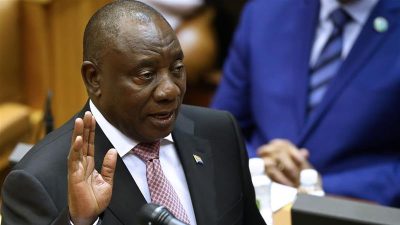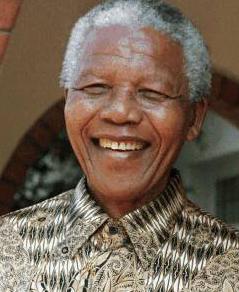South African President Cyril Ramaphosa Secures Second Term Under ANC-led Government of National Unity
Five political parties form alliance within the National Assembly and Provincial structures

All Global Research articles can be read in 51 languages by activating the Translate Website button below the author’s name (only available in desktop version).
To receive Global Research’s Daily Newsletter (selected articles), click here.
Click the share button above to email/forward this article to your friends and colleagues. Follow us on Instagram and Twitter and subscribe to our Telegram Channel. Feel free to repost and share widely Global Research articles.
Give Truth a Chance. Secure Your Access to Unchained News, Donate to Global Research.
***
South Africa held its seventh national and provincial elections in late May where approximately 58 percent of the eligible voters cast ballots.
The democratic breakthrough of 1994 led to the first non-racial elections since the establishment of the racist settler-colonial system of apartheid.
 Nelson Mandela, the then president of the African National Congress (ANC), won the elections 30 years ago creating the first Government of National Unity (GNU) which lasted from 1994-1997.
Nelson Mandela, the then president of the African National Congress (ANC), won the elections 30 years ago creating the first Government of National Unity (GNU) which lasted from 1994-1997.
In the 1994 elections, the ANC secured nearly two-thirds of the votes after waging decades of mass and armed struggles aimed at the destruction of the unjust and exploitative social order.In the most recent elections, the ANC acquired 40 percent of the votes with the Democratic Alliance (DA) coming in second, attaining 21 percent. Following the DA was the MK Party which was only formed in the lead up to the May elections. Coming in fourth was the Economic Freedom Fighters (EFF). The MK attained nearly 15 percent and the EFF 9 percent.
Both the EFF and MK are breakaway groupings from the ruling ANC. Combined these three parties could have easily secured 64 percent of the votes. With the failure of the ANC to achieve in excess of 50 percent, the largest party was compelled to select other parties to form a unity administration.
After intensive internal discussions within the National Executive Committee (NEC), the ANC in consultation with its allies in the South African Communist Party (SACP), Congress of South African Trade Unions (COSATU) and the South African National Civic Organizations (SANCO), decided to form the GNU. Several other parties were approached to join the GNU. Eventually agreements were reached with the DA and the Inkhata Freedom Party (IFP) to serve as the major anchors for the GNU.
Later two other small parties, the Patriotic Alliance (PA) based in the Western Cape, and the GOOD Party, headed by the Minister of Tourism, Patricia de Lille, joined the GNU. At present this alliance of five political parties represents 68 percent of the National Assembly in Cape Town. De Lille has undergone several political transformations since 1994. She first entered parliament as a representative of the Pan-Africanist Congress (PAC). In subsequent years she formed the Independent Democrats (ID) which eventually merged with the DA. She was forced to resign from the DA under allegations of concealing corruption and later accepted a cabinet position in the ANC government in May 2019.
At present negotiations are underway to determine allocations of cabinet positions. The ANC’s Ramaphosa was elected as president by the National Assembly along with Deputy President Paul Mashatile, also of the ANC. The ANC will retain its leadership role as Speaker of the National Assembly under Thoko Didiza. The Deputy Speaker is a DA member Annelie Lotriet.
Of the nine provinces in the Republic of South Africa, the ANC will control the premierships within seven. The DA maintained its control of the Western Cape while the IFP, after forming alliances with the ANC and the DA, took control of the KwaZulu Natal provincial premiership.
In a statement issued by the ANC on June 17, it states the objectives of the party within the GNU, noting:
“The GNU’s priorities and minimum program are fully aligned with the ANC’s longstanding commitments and policies. We are dedicated to achieving rapid, inclusive, and sustainable economic growth, job creation, land reform, industrialization, and infrastructure development. Our objective is to create a just society that addresses poverty, spatial inequalities, food security, and the high cost of living, while protecting workers’ rights and delivering quality basic services. The GNU will ensure representation in government and legislatures by all participating parties, making decisions by consensus, with mechanisms for conflict resolution where necessary. The President will exercise the prerogative to appoint the Cabinet, in consultation with leaders of GNU parties, adhering to existing protocols on government decision-making and budgeting. All political parties represented in legislatures remain welcome to join the GNU even after its formation as its very ethos is a spirit of inclusivity.”
Not the First GNU
Mandela and many other ANC members spent decades in apartheid prisons prior to their release during the late 1980s and early 1990s. Other liberation and anti-colonial movements also faced severe consequences for their activities which extended back to the mid-17th century when the Dutch settlers entered the Cape area in 1652. Later during the 18th and 19th centuries, the British and the French colonialists fought for the control of this important territory in attempts to dominate the strategic trade routes along the Indian Ocean coastlines.
At the turn of the 19th and 20th centuries, the British and Boer settlers fought a war over which colonial entity would control the country. Although the British won the Anglo-Boer War of 1898-1902, the Union of South Africa which was established in 1910 represented the consolidation of white domination.
By 1948, the Boer-dominated Nationalist Party (NP) became the leading force under the colonial system. The creation of the apartheid system after 1948 was designed to divide and maintain control over the majority African, Colored (mixed race) and Indian population groups.
Nonetheless, the mass struggle to end institutional racial domination accelerated during the 1950s with the Defiance Against Unjust Laws campaign. A coalition between the vanguard organizations among the African, Colored and Indian populations, known as the National Action Council, drafted the Freedom Charter in June 1955 at the Congress of the People in Kliptown.
The apartheid regime sought to imprison and drive into exile the leadership of these organizations by leveling charges of treason. A trial went on for four years which resulted in the acquittal of these leaders in 1960.
However, the escalating repression by the apartheid government culminated in the Sharpeville massacre of March 21, 1960, when dozens were killed and injured by the police. In 1961, Um Khonto we Sizwe (Spear of the Nation) was formed as a guerrilla force which waged an armed struggle against the racist system between December 1961 and August 1990.
What is important to acknowledge is that this is not the first GNU formed since the overthrow of the apartheid regime. During the early years of the National Democratic Revolution, the ANC shared power with the Nationalist Party (NP), the ruling entity under apartheid. This arrangement was carried out to ensure the political transition to majority rule.
According to the South Africa History online website:
“From 27 April 1994 to 3 February 1997, South Africa was governed by a Government of National Unity (GNU) under the leadership of African National Congress (ANC). Clause 88 of the interim Constitution of South Africa provided for the establishment of the Government of National Unity. After the first democratic election in 1994, 19,726,579 votes were counted and 193,081 were rejected as invalid. The African National Congress (ANC) in alliance with the labor confederation COSATU and the South African Communist Party (SACP) fell slightly short of a two-thirds majority. The Government of National Unity was established and headed by Nelson Mandela as a president and FW De Klerk as his deputy president. Mandela’s cabinet included ministers from other political parties as well as members of the National Party and Inkatha Freedom Party.”
The NP under the leadership of F.W. De Klerk announced their intentions to withdraw from the GNU in June 1996 citing its disagreements with the ANC over major policy issues. De Klerk then retired from politics leaving the NP in disarray. The NP was later dissolved while the DA was later formed and became the major opposition party to ANC rule.
In regard to the present GNU, COSATU and the SACP have issued statements on the outcome of the elections. COSATU said in a press release on June 19 that:
“The Congress of South African Trade Unions (COSATU) congratulates President Cyril Ramaphosa on his inauguration for a second term as head of state of South Africa. Admittedly, this was a difficult election for our Alliance Partners, the African National Congress (ANC), the South African Communist Party (SACP) and ourselves, however, we are grateful that millions of ordinary South Africans have entrusted the ANC to be leader of government nationally and across provinces.”
Just four days earlier, the SACP emphasized in a statement:
“The South African Communist Party (SACP) welcomes the democratic return of the African National Congress (ANC) as the leader of our government, with President Cyril Ramaphosa re-elected on Friday night, 14 June 2024, and Thoko Didiza elected as the Speaker of the National Assembly. The balance of political forces under which this happened, measured by the distribution of seats and conduct of a number of political parties prior to the first sitting of and in the National Assembly following the May 2024 elections, was characterized by precarity.”
These developments in South Africa will be watched closely both inside the country as well as internationally. Undoubtedly, the struggle for a genuinely revolutionary democratic South Africa will continue.
*
Note to readers: Please click the share button above. Follow us on Instagram and Twitter and subscribe to our Telegram Channel. Feel free to repost and share widely Global Research articles.
Abayomi Azikiwe is the editor of the Pan-African News Wire. He is a regular contributor to Global Research.


